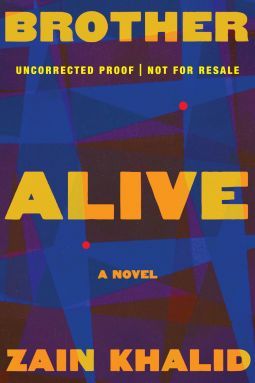
Brother Alive
An astonishing debut novel about family, sexuality, and capitalist systems of control, following three adopted brothers who live above a mosque in Staten Island with their imam father In 1990, three boys are born, unrelated but intertwined by circumstance: Dayo, Iseul, and Youssef. They are adopted as infants and live in a shared bedroom perched atop a mosque in one of Staten Island's most diverse and precarious neighborhoods, Coolidge. The three boys are a conspicuous trio: Dayo is of Nigerian origin, Iseul is Korean, and Youssef indeterminately Middle Eastern, but they are so close as to be almost inseparable. Nevertheless, Youssef is keeping a secret from his brothers: he has an imaginary double, a familiar who seems absolutely real, a shapeshifting creature he calls Brother. Brother is both a balm for the young boy and a curse--he provides solace to Youssef but demands information in exchange. The boys' adoptive father, Imam Salim, is popular in the community, known for his radical sermons extolling the virtues of opting out of Western ideologies. But he is uncharismatic at home, a distant father who spends evenings in his study with whiskey-laced coffee, writing letters to his former compatriots back in Saudi Arabia. Like Youssef, he too has secrets, including the cause of his failing health, the reason for his nighttime excursions from the house, and the truth about what happened to the boys' parents. When Imam Salim's path takes him back to Saudi Arabia, the boys will be forced to follow. There they will be captivated by an opulent, almost futuristic world, a linear city that seems to offer a more sustainable modernity than that of the West, and will find traces of their parents' stories. But they will have to change if they want to survive in this new world, and the arrival of a creature as powerful as Brother will not go unnoticed. With stylistic brilliance and intellectual acuity, in Brother Alive Zain Khalid brings characters to vivid life with a bold energy that matches the great themes of his novel--family, capital, power, sexuality, and the possibility of reunion for those who are broken.
Reviews
Lindsay@schnurln
Tabea Lüth@tabealt
Julia Weyrauch@juhuuulia
Varun Jayaraman@sobafuchs
Laura Vroom@lvroomie
James Maskell@jmaskell
Highlights
Tabea Lüth@tabealt
Tabea Lüth@tabealt
Tabea Lüth@tabealt
Tabea Lüth@tabealt
Lindsay@schnurln
Lindsay@schnurln
Lindsay@schnurln
Lindsay@schnurln